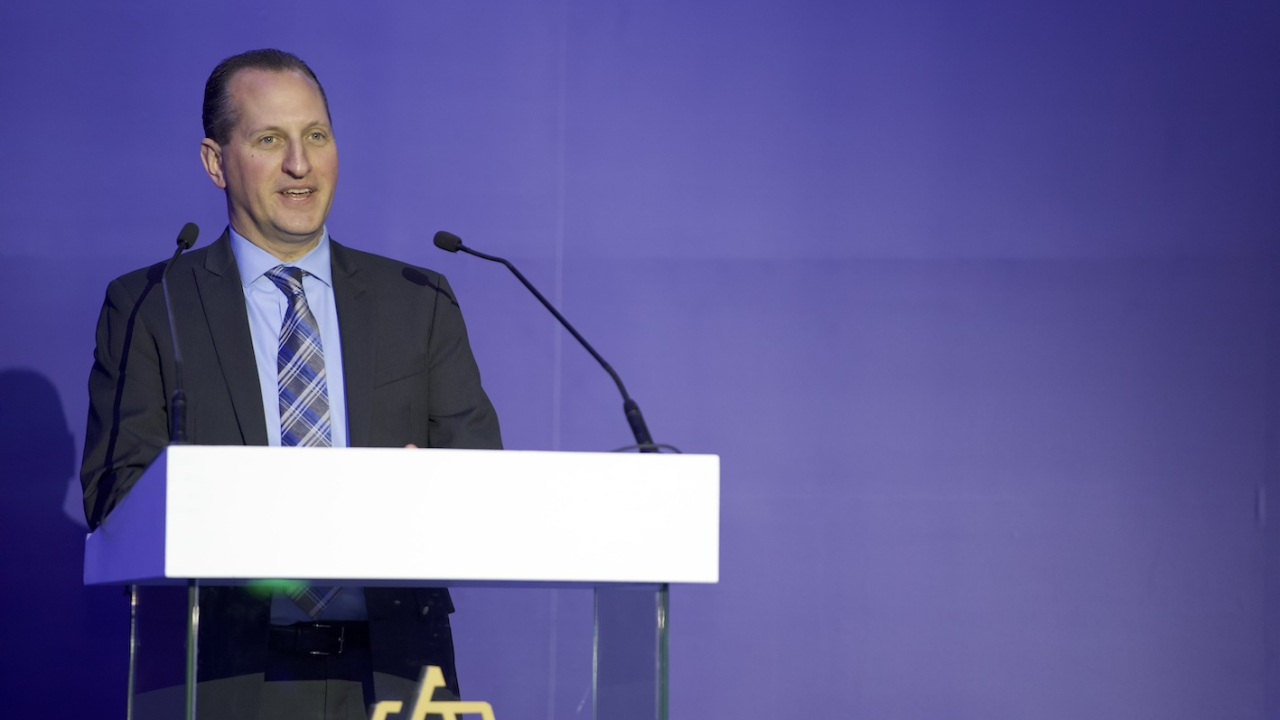UAE presents new offset guidelines

He was speaking at the Annual Joint Meeting of the A|D|S sponsored United Kingdom Offset Operations Group (UKOOG) and the London Countertrade Roundtable (LCR), held at the London offices of international law firm Bird & Bird.
The OPB's new policy was announced just before Eurosatory 2010 and since then the Bureau has been keen to highlight its benefits, which include greater flexibility and more involvement by international defence companies.
Matar Ali Al Romaithi stressed that the UAE is keen to work with international defence companies in negotiating multipliers but will require total transparency in line with best practice and the highest international standards, whilst emphasising that there is no preference for the required local partner chosen. He also said: "Defence contractor offset plan approval is mandatory before a GHQ contract can be completed."
Above and below: Matar Ali Al Romaithi speaking at the Joint UKOOG/ LCR Offset Seminar earlier today.
The roll-out of the new offset rules since June 2010 has created a particular buzz and expectation among offset professionals, as it has been reported that the full and complete guidelines will only be issued to those companies who sign a non-disclosure agreement. That said, with the concurrent formation of the Offset Committee and the Defence Contractors Council - and their very visible support of several industry conferences over recent months - the OPB is clearly doing all it can to publicise the new rules and explain their evolution.
As he set out some of the key points of the new rules Mr Al Romaithi said: “The new policy is more focused towards ‘partnering’ with defence companies.”
Most notably, the new policy makes a clear distinction between ‘input-based’ and ‘output-based’ projects. Input-based projects might include ‘industry enablers’, ‘knowledge-empowerment’ projects and equity contributions, carry a maximum multiplier of 2.0. Examples of projects might include apprenticeships, cash contributions and investment or the giving/loaning of specialist equipment. However 70% of the obligation must be satisfied through ‘output-based’ projects; these could be judged against net profit, export sales or the number of UAE nationals employed for example. The output-based projects also carry a higher multiplier (2.0 – 5.0) perhaps illustrating the OPB’s new priorities.
Mr Al Romaithi also outlined some of the focus areas for the OPB, making the distinction between ‘Components’ (e.g. advanced material parts, technical services, precision manufacturing and advanced electronics) and ‘Systems’ (e.g. strategic technical systems, infrastructure systems, transportation equipment systems and oil & gas systems).
Much of the other characteristics of the policy - such as quota, threshold and penalties - remain familiar, if unchanged, although it is worth noting that the OPB has now introduced a ‘grace period’ into the policy allowing pre-contract activity to be banked. Banked credits can then, as before, be swapped and traded without restriction.
Alongside Matar Ali Romaithi, there were presentations by Paul Briggs, Partner at Bird & Bird, Martin Elbourne, BAE Systems and Leen De Jong, Dutch Ministry of Economic Affairs, which were welcomed by Colin Heritage. Managing Director of Stemcor Trade Finance Ltd and Chairman of LCR and Brinley Salzmann, Director, Overseas & Exports A|D|S and Secretary of UKOOG in their closing remarks, as well as by the attending industry delegates, including A|D|S offset advisors, Offsets 2000 Ltd.
A|D|S will be joining with the UAE's OPB to organise the biennial Abu Dhabi International Offset Conference (ADIOC ), being held at the Emirates Palace, Abu Dhabi, UAE, from the 15th to 17th February 2011, timed to coincide with the (also biennial) 10th International Defence & Conference Exhibition (IDEX 2011).
Further insight can be found on the OPB website (www.offset.ae
) or the Offsets 2000 site (www.offsets2000.com
).
Stay up to date
Subscribe to the free Times Aerospace newsletter and receive the latest content every week. We'll never share your email address.

